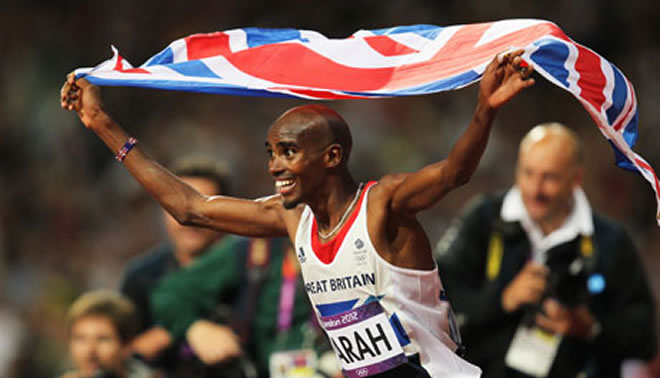Mo Farah's glorious gold medal symbolises the emergence of Britain's Somali community
Somali-born Mo Farah celebrates winning the Olympic 10,000 metres in London, the city he grew up in from the age of eight. Photograph: Jason O'Brien/Action Images

Nadifa Mohamed
Tuesday, August 07, 2012
For most of my childhood in London people were confused by me. They would look at me askance and ask, "Are you Pakistani or Jamaican?" "I'm from Somalia," I would reply irritably, receiving a blank look before the inevitable response: "Where's that, then?"
After Mo Farah's glorious Olympics victory on Saturday night I hope I won't have to be asked that again.
Much has been written about how Britain's Jamaican community celebrated Usain Bolt's charge to gold. But British Somalis, who have been here in numbers for over two decades, are not so firmly placed in the national consciousness. And often when we are written about it is with the worst connotations: violence, terrorism, gangs. Farah, the journalist Rageh Omar and the rapper K'naan go some way in creating a positive image, but young Somalis' sense of identity seems more powerfully formed by the persistently negative representations found in the media.
Five years ago I tutored children in London, aged eight to 14, and asked what made them proud of their heritage. They struggled to answer. They knew little more about the history of Somalia than my English classmates. Some of them had been born in Somalia, others in the Gulf, others had spent time in refugee centres in Norway, and despite holding closely to their Somaliness – the language, the family networks, the food – it was almost like a tatty old blanket they found comfort in but that had no intrinsic value. As they got older, they either preferred to identify with a wider black culture or put Islam at the centre of their lives and identity. Somali culture seemed parochial, uncool, too much about clans and conflict to warrant their attention. It was almost as if the ambivalent place in the world that Somalia held – a state only in name, a stretch of Africa heavily influenced by Asia – was reflected in the confusion these children experienced.
Looking at the statistics surrounding Somalis it is easy to despair – at the unemployment and poverty rates, educational underachievement and criminal overachievement – but it is not a picture I recognise. The world I know is much more complicated: a family of six might share a two-bedroom council flat, but the children are hot-housed, studying the Qur'an two nights a week and Kumon maths at weekends.
A single mother might not buy a car because she is saving up to build a house in Mogadishu or Hargeisa for her eventual return. A young man in a baseball cap working nightshifts in a warehouse or supermarket might be the breadwinner for his family here and in Somalia. After 20 years in the UK the Somali community is still in flux; walking down Uxbridge Road in west London, you pass successful Somali restaurants, internet cafes and money-transfer companies; while Camden Town at night reveals young Somalis in handcuffs being led into police vans. Sometimes nuclear families show the divide, with one sibling at university and the other in Feltham.
While Jamaican, Nigerian and other black communities have put down roots in Britain, sending MPs to parliament and joining professions, Somalis have been nomads on a global scale – arriving and then leaving in ever greater numbers over the past 150 years. The civil war of the late 80s and early 90s saw the largest influx, and for many Somalis Britain was a temporary home, a place to shelter from the storm. Despite occasional – sometimes antagonistic – interactions with other black communities, they have remained largely separate, maybe divided by the growth of evangelical forms of Christianity and Islam in migrant areas, each group seeing the other as too new, too foreign and too troublesome.
As the political situation that drove Somalis to Britain improves, there is now the opportunity for return, and some are drifting back to their homeland, rebuilding interrupted lives. What part of Britain they take back with them remains to be seen. Will it be a strict stratification between classes? Will they build a welfare system? Will they reject or embrace the freedoms they enjoyed here? Will the children grow up missing Britain the way I missed Somalia?
For those who decide to remain, a new relationship to this country is developing; a sense of curiosity replacing the insularity that has grown over the past 20 years. As second- and third-generation British Somalis put down roots, a community that has been ignored since the first Somali sailors sailed up the Thames will begin to demand attention.
Nadifa Mohamed is author of Black Mamba Boy